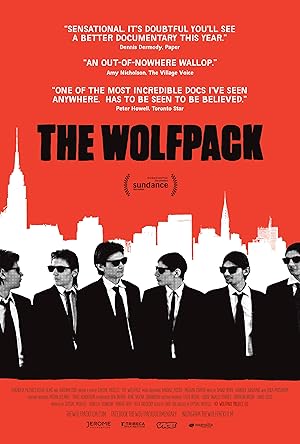When I read about The Wolfpack, I knew that I would see it, but not in theaters. How in the world could a large group of children be isolated from the world in Manhattan?!? How can you afford to have that many children and live in an apartment large enough in NYC? Wouldn’t the neighbors complain about the kids upstairs and all the noise that they were making? In Middle America, you can have a compound, grow your own food and be isolated away from your neighbors, but in NYC, it is expensive and tightly packed. Sure people keep to themselves, and it takes a lot of weird to get a New Yorker’s attention, but surely The Wolfpack, i.e. the term that the filmmaker uses to describe the brothers and the film title, would rise to this standard? Apparently not.
Crystal Moselle directed The Wolfpack, but I noticed that when people review The Wolfpack, they act as if it was created by The Wolfpack, i.e. six brothers who in their isolation became obsessed with films, recreated them in the confines of their apartment, and once they entered the world, looked to the film industry for work. On one hand, this perspective is understandable because Moselle’s filmmaking style is more of a slice of documentary like Meet the Fokkens where Moselle lets her subjects take the lead, and her subjects are amateur filmmakers as opposed to Moselle taking a PBS analytical documentary that is looking to exhaustively examine and consciously frame her subject. On the other hand, when male directors take this approach, their documentaries do not suddenly get attributed to their subject matter.
Moselle’s approach in making The Wolfpack makes sense in an ethical way. You wouldn’t want to frighten off these brothers who are initially tentatively exploring the world, further traumatize and exploit them or stunt their creativity. On the other hand, I found it frustrating as a viewer because most of my questions were left unanswered, and even at 90 minutes, The Wolfpack began to lose my attention. The Wolfpack’s shapeless narrative and unhurried approach to answering the obvious questions of their upbringing made it difficult as a viewer to find a rhythm and anticipate what was coming.
To be fair, The Wolfpack’s goal was to focus on the boys, and not their parents, their neighbors or their community so maybe I’m asking questions that The Wolfpack never set out to answer. The father is probably mentally ill, definitely controlling and abusive, and probably an alcoholic. At some point, the mother consented to this lifestyle, but since she had not spoken to her family in a long time, The Wolfpack implies that there may have been a point where consent was withdrawn and abuse entered their relationship. The Wolfpack implicitly suggests that because their mother homeschooled her children, and they never left the house, the psychological abuse was not obvious to the community.
The Wolfpack never asks an important question of the father, who barely appears in the documentary. If he was so afraid of the outside world negatively influencing his children, why did he let them see so many movies? There is a scene early in the movie that shows The Wolfpack recreating a scene from a movie and setting fire to something inside their apartment. I involuntarily and unfairly thought for a brief moment, “They are crazy,” which they obviously aren’t, but children creatively coping with an insane set of circumstances in a community that has failed them. Perhaps I left with the wrong lesson, but The Wolfpack further convinced me that parents don’t have a right to raise their children as they see fit. They have a responsibility, and the community and/or the government has a responsibility to make sure that the parents do not fail in that responsibility even if that means going behind closed doors to do so. Also the standard of when the medical community can force someone to get mental health treatment is too ridiculously high, and the consequences are too grave for those around them.
Stay In The Know
Join my mailing list to get updates about recent reviews, upcoming speaking engagements, and film news.





